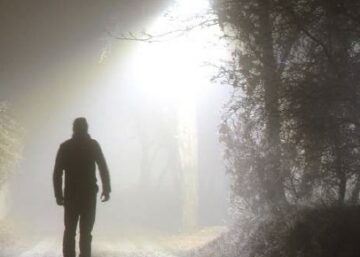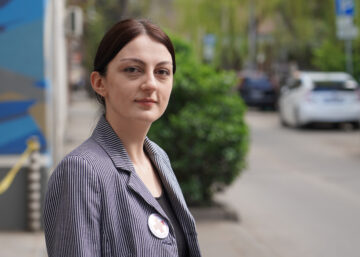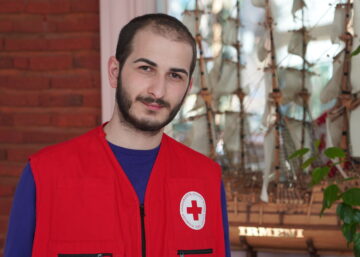“I joined the team shortly before the pandemic. And the pandemic itself had a tragic effect on my life – I lost my husband because of COVID-19 and was left completely alone. I find it hard to get used to the fact that I could not save him.
Without my job, my colleagues, and the team that stood with me on the front lines in the most difficult moments of the pandemic, I do not know how I would have dealt with this personal tragedy”.
The Red Cross currently carries out the home care of more than 200 socially vulnerable beneficiaries. Most of them are elderly patients with chronic diseases.
It is my duty to monitor their health status. Together with the social workers and home care nurses, I am responsible to develop a health management plan for each of the beneficiaries and to decide the frequency of visits as well as the necessary medical procedures for them. Furthermore I monitor the ongoing process and receive feedback.
During the pandemic, our beneficiaries were one of the most vulnerable groups. They were under severe stress, as most of them are lonely people with chronic diseases and with limited connection to outside world. At this critical moment, together with our team, I stayed with them to provide support and ensure their safety. Sometimes it was too hard to cope with, but the strong feeling of responsibility for being constantly mobilized and ready to help at this critical moment, had never left me.
It is worth noting that I do not remember moments when any of our team-members expressed confusion, fear or panic. This is probably because of the Red Cross experience. Actually, in an incredibly short time it was possible to rearrange our work and to adapt it to the requirements of the pandemic.
Our home-care nurses were fully provided with all the protective equipment, individual transport, even an apartment, when it was necessary. Thus we took strong care of the safety of our bedridden and vulnerable beneficiaries to prevent them from getting infected.
During the pandemic, the calls on my phone never stopped. I had to answer more than 20 calls a day. In case of urgent need, I had to ensure immediate visits and all the necessary medical care and support for my patients. As the health care system was in complete collapse, I actually had to perform additional duties for ambulance and family doctors.
It was a big work-load and really hard, both physically and mentally. I remember one of our beneficiaries calling me eleven times during the course of a day – arguing that he could not breathe and demanding us to take him to the hospital. Indeed, it was hard time for all of us.
I am proud to say that we have successfully overcome the peak phases of the pandemic and no one among our beneficiaries has been infected – in fact, in two years, we have not had a single case of COVID-19. Only later, when lighter variants spread, we had a few cases of infection. However none of our patients needed to be hospitalized and we managed the virus at home successfully.
I consider this to be the greatest reward for me as a doctor. The positive result of our joint efforts has completely alleviated all our past fatigue and emotional overload.


